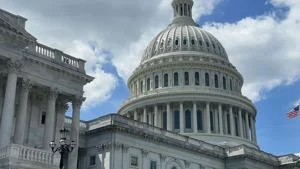U.S. senators are heading into their August recess with plans to combine and pass three government funding bills into one “minibus” package before leaving.
The unorthodox move is the result of Republican leaders spending days negotiating with uncooperative Democrats, who have stalled on confirming the rest of President Donald Trump’s civilian nominees and by doing so prevented progress on the funding appropriations process.
Congress has until Sept. 30 – the end of fiscal year 2025 – to pass all 12 annual appropriations bills that provide funding for federal agencies to spend on programs. If lawmakers do not pass all 12 in some form through both chambers of Congress, they risk a government shutdown.
So far, only two of those bills have passed the House and none have passed the Senate. But under pressure from Trump in a late Thursday night post, Senate Majority Leader John Thune, R-S.D., has finally decided on a course of action.
“The Senate must stay in Session, taking no recess, until the entire Executive Calendar is CLEAR!!!,” Trump posted on Truth Social. “Republicans, for the health and safety of the USA, DO YOUR JOB, and confirm All Nominees. They should NOT BE FORCED TO WAIT.”
According to Appropriations Chair Susan Collins, R-Maine, Senate leaders’ plan is to bundle together and vote on the funding bills crafted by the subcommittees on:
Military Construction, Veterans Affairs, and Related AgenciesAgriculture, Rural Development, Food and Drug Administration, and Related AgenciesLegislative Branch
Thune has not yet publicly announced at what time the minibus vote will occur.
Congress never passed a fiscal year 2025 budget, instead passing three consecutive CRs to keep government funding on cruise control until Sept. 30.
Although Republicans originally planned to craft and pass the government funding bills soon after the One Big Beautiful Bill Act became law, the immediate introduction of a $9 billion rescissions bill caused weeks of delay.
After the rescissions bill passed on partisan lines, many Democrats swore off working bipartisanly to fund the government, objecting to the apparent pointlessness of reaching compromises with Republicans on funding priorities if the majority could simply rescind content they didn’t like later.
“Democrats should tell Republicans that if they want our votes, they will have to guarantee that any deal we strike actually means something,” Sen. Elizabeth Warren, D-Mass., told lawmakers.






